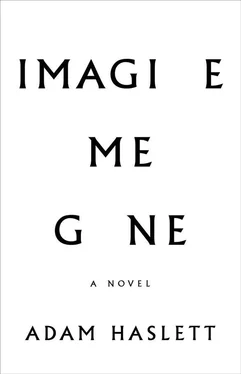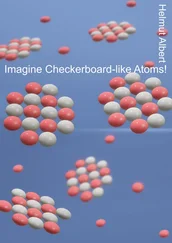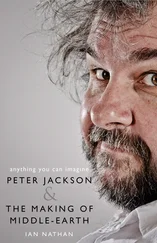“You don’t have to think about that right now. We’re stepping out of that for a while. Things’ll look different when your mind’s clearer. Which is why I think you should come off the Klonopin, too.”
“I can’t do that,” he said.
“Yes you can.”
“It’s not what we agreed.”
“It’s what you want, though. When it comes down to it, right? You’ve said so yourself.”
“Coming off that’s what put me in the hospital.”
“You were alone then. You’re not now.”
We were doing the right thing. He just needed to take off the last bandage. Like Celia said, the sedatives had walled his feelings in. And the higher the walls got, the more he feared what they protected him from.
But I didn’t press the idea further right then. I needed to let it settle. I waited, instead, until we were eating supper that evening.
“It would take months,” he said.
“I get that it’s frightening — the idea of not having that particular drug anymore.”
“It’s not the idea, it’s the chemistry.”
When we’d arrived, he wouldn’t have been able to even consider this. But here he was, considering it.
“Are you better now than the day you first took it?”
“Of course not,” he said. His face was rigid with apprehension. But there was a pleading in his eyes. “You really think I could do it?”
“Yes. I think you can.”
I’d bought us ice cream for dessert. We ate it in front of The Bourne Identity. In the final sequence, Matt Damon hunted snipers in the woods and fields around the country house where he’d fled with the woman from Run Lola Run. The Mitchells had installed a flat-screen television with excellent speakers, and the crack of the rifle as Damon shot his attackers satisfied us both. Michael even smiled.
The next morning he asked if we should get rid of the booze in the house. He was afraid that he would resort to it if he tried coming off his last medication.
Without answering, I emptied the fridge of the beer and wine we had brought with us and poured each bottle down the kitchen sink as he watched. I rinsed them and took them out to the bins, and then I found a cardboard box and loaded the Mitchells’ own liquor cabinet into it, and brought that to the sink as well. I was about to start pouring their bottles down the drain when it occurred to me it would probably be several hundred dollars’ worth of alcohol to replace. Michael was still at the kitchen table, watching me.
“I’ll take care of the rest of this,” I said. “You should go listen to some music. You haven’t been doing much of that.”
I waited until I heard him open his laptop, followed by the tinny sound of synthesizers coming from his headset. Then I carried the box of bottles out to the shed and set it down behind the folded lawn chairs.
“We’re clear,” I said when I came back in. “You can give me the pills.”
“You know I take them for a reason,” he said. “I’m not an addict. It’s not like I was fine before.”
“I know.”
“It’s an illness,” he said. “I’m not malingering.”
“I never said you were.”
“Dr. Bennet said he thinks I’d qualify for disability. He said he doesn’t support it for most of his patients, but that he would for me — that my condition is that severe.”
“That’s what you want? To make it permanent like that? To get a subsidy for it? If you wanted that, why come this far? If it’s all insulin for the diabetic, why even agree to come up here?”
“You told me I had to.”
“No. I offered. And you agreed.”
“You don’t want Mom to sell the house. You think she should stop supporting me.”
“That’s true,” I said. “But do you really think I don’t want to help you? You always say talking about the anxiety takes the edge off, and that’s why you’re on the phone with Caleigh so much. Well, I’m here. You don’t need a phone, you can talk as much as you need to. I’m not going anywhere.”
He was trying his best to believe me.
My mother had promised to refrain from calling too often, but when the phone rang just then I knew it would be her.
“It’s very cold up there,” she said. “And you’re getting another four inches of snow tonight.”
Wherever I went, she knew more about the weather than I did.
“I’m mailing you some cranberry bread today, and I’m going to put in some cranberry sauce as well. I know you said you weren’t doing a whole Thanksgiving dinner, but just in case. You might change your mind. How much longer do you think you’ll be?”
She wanted me to assure her that Michael was all right. Whatever the content of her questions that was their purpose. I told her, as I had from the beginning, that I didn’t know how much time it would take, but that she could go ahead and send her package.
Michael stayed on the line with her longer, describing his fitful sleep and his morning nausea, but telling her not to worry. He’d been freer of her at nineteen, living in Britain, than ever since. Sharing every step of this with her wasn’t going to help, but I couldn’t control them both.
Before Michael went to bed that night, I gave him three-quarters of his usual evening dose of Klonopin, which was two pills. I knew this drug was different. To come off it too quickly could be dangerous. It would take time. But we didn’t have months to work with, which meant we just had to do the best that we could.
“It’s all right if you need to wake me up,” I said. “Just knock on my door.”
He swallowed the tablet and a half in front of me and held his hand flat against his sternum, as if monitoring his breath.
I half expected him to revolt right away and demand the pills back, but his sleep didn’t worsen that night, or the next few nights, through the end of our second week in the cabin, and so he agreed reluctantly to my suggestion that we cut back his morning dose, too. I kept the medicine bottle in my room and doled the tablets out to him like a nurse.
Usually when I traveled, Seth and I spoke every evening, but I had called him only twice thus far, which had pissed him off. Given how we’d parted, though, he wasn’t going to offer me the satisfaction of showing it. The third time I called him, the night before he flew to Denver for Thanksgiving, he was as remote as ever, asking me civil questions and listening to my civil replies. And yet even this much contact with him made me bristle. I’d sequestered Michael and myself for a reason. It’s how it had to be.
“I just need time,” I said. “It won’t last forever.”
“You’re the one who called,” he said.
“I want to go away with you, and I want to meet your family. But I have to do this first.”
“I know.”
I couldn’t blame him for his flat tone, or his disappointment. I asked dutifully about his week and who else would be coming for the holiday, but when our conversation petered out neither of us tried to revive it.
That night I heard Michael get up to use the bathroom several times, and when I went myself, the light was on under his door. He had to have heard me, to have known I was awake, but he didn’t call out and I didn’t knock. The next morning he was in a panic. He’d barely slept, and said his heart was beating like a jackrabbit’s.
“You need to give me the pills,” he said.
I didn’t shout at him, I didn’t tell him he was being irrational, I just said that the beginning would be the toughest, mentally, and that if he didn’t sleep at night he could take as many naps during the day as he needed. He wasn’t listening to me, though. He was too far inside himself. I handed him his coat and told him to come with me out of the cabin right away, before breakfast, knowing the cold would at least distract him.
Читать дальше












